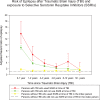Selective serotonin reuptake inhibitors and risk of epilepsy after traumatic brain injury - A population based cohort study
- PMID: 31323024
- PMCID: PMC6641473
- DOI: 10.1371/journal.pone.0219137
Selective serotonin reuptake inhibitors and risk of epilepsy after traumatic brain injury - A population based cohort study
Abstract
Objective: Traumatic brain injury (TBI) is common and associated with a marked increased risk of developing epilepsy. Animal studies indicate that treatment with selective serotonin reuptake inhibitors (SSRIs) may increase the risk of epilepsy after TBI. The aim of this study was to investigate whether use of SSRIs modifies the risk of epilepsy after TBI.
Methods: This was a cohort study of 205,715 persons, who suffered a TBI in Denmark from 1996 to 2013. For each person with TBI, we matched 10 reference persons (N = 2,057,150) who were alive on the day of TBI and who had the same age and gender but had no history of TBI. We used a stratified Cox regression to calculate the relative risk of epilepsy after TBI for persons exposed to TBI, SSRI or both after adjustment for income, civil status, medical and neurological comorbidities, severe mental disease, and substance abuse.
Results: The risk of epilepsy was 5.61 times higher for persons who used SSRI at time of TBI (adjusted Hazard Ratio (aHR): 5.61 (95% CI: 4.88; 6.45)), 3.23 times higher for persons who had a TBI but did not use SSRI at time of TBI (aHR: 3.23 (95% CI: 3.12;3.35)), and 1.31 times higher for persons who used SSRI but had no TBI (aHR: 1.31 (95% CI: 1.18; 1.45)) compared to persons unexposed to both TBI and SSRI.
Conclusions: This large population based cohort study showed that people using SSRI at the time of a TBI had higher risk of developing epilepsy compared to people not using SSRI at the time of TBI. The results are in line with those of animal studies and calls for further studies to evaluate whether the association is due to SSRIs or to the underlying disease (e.g. depression or anxiety).
Conflict of interest statement
JC received honoraria from serving on the scientific advisory board of UCB Nordic and Eisai AB, received honoraria from giving lectures from UCB Nordic and Eisai AB, and received funding for a trip from UCB Nordic. The other authors report no conflicts of interests. This does not alter our adherence to PLOS ONE policies on sharing data and materials.


